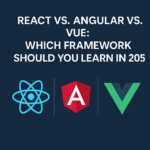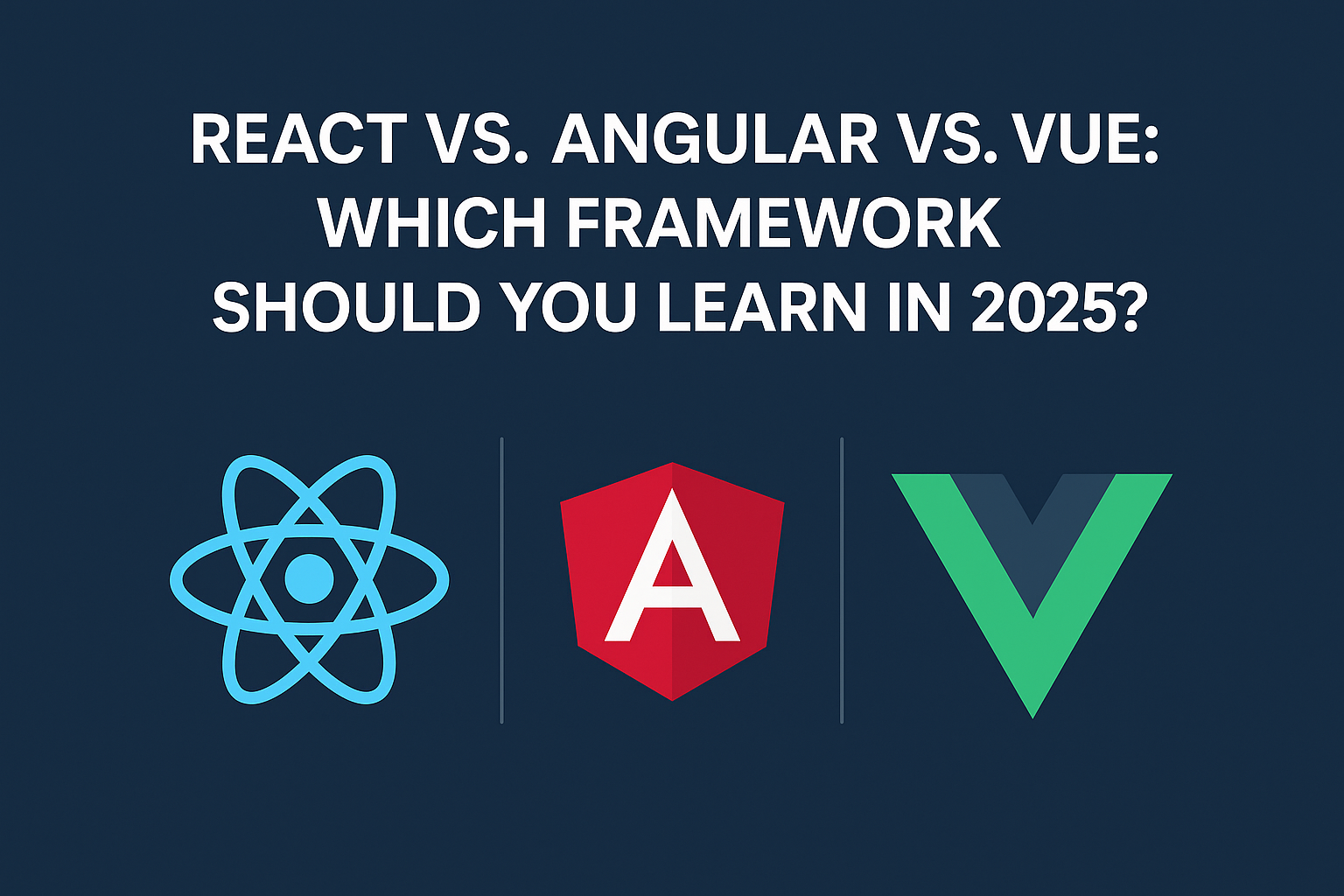
React vs. Angular vs. Vue: Which Framework Should You Learn in 2025?
The JavaScript ecosystem continues to evolve at breakneck speed, and choosing the right frontend framework can make or break your development career. As we navigate through 2025, React, Angular, and Vue remain the three dominant players in the frontend development arena. But which one deserves your precious learning time?
Let’s dive deep into each framework’s strengths, weaknesses, and current market position to help you make an informed decision.
The Current Landscape: Market Share and Industry Adoption
Before we dissect each framework, let’s look at where they stand in 2025:
React continues to dominate with approximately 40% market share, maintaining its position as the most widely adopted frontend framework. Major companies like Facebook, Netflix, Airbnb, and countless startups rely heavily on React.
Angular holds steady at around 22% market share, particularly strong in enterprise environments. Companies like Google, Microsoft, and IBM continue to bet big on Angular for large-scale applications.
Vue maintains its 18% market share, with particularly strong adoption in Asia and among smaller to medium-sized companies. It’s the go-to choice for many developers who want something between React’s flexibility and Angular’s structure.
React: The Flexibility Champion
What Makes React Stand Out
React’s component-based architecture and virtual DOM have revolutionized how we think about building user interfaces. Its philosophy of “learn once, write anywhere” has proven incredibly powerful, especially with React Native extending its reach to mobile development.
Key Strengths:
- Massive ecosystem: The npm registry is flooded with React libraries and tools
- Job market dominance: More React job opportunities than any other frontend framework
- Learning curve: Relatively gentle introduction to modern frontend development
- Community support: Largest and most active community with abundant resources
- Performance: Excellent performance with proper optimization
- Flexibility: Minimal opinions about how you structure your application
Notable Weaknesses:
- Decision fatigue: Too many choices can overwhelm beginners
- Rapid changes: The ecosystem moves fast, requiring constant learning
- Boilerplate: Can require significant setup for complex applications
- State management: Needs additional libraries for complex state management
React in 2025: What’s New
React 19 brought significant improvements with automatic batching, concurrent features, and better server-side rendering. The introduction of React Server Components has made React even more compelling for full-stack applications.
Angular: The Enterprise Powerhouse
Angular’s Unique Position
Angular takes a different approach with its opinionated, batteries-included philosophy. It’s a complete framework rather than just a library, providing everything you need to build large-scale applications out of the box.
Key Strengths:
- Complete solution: Includes routing, HTTP client, testing utilities, and more
- TypeScript-first: Built with TypeScript, providing excellent type safety
- Enterprise-ready: Excellent for large, complex applications
- Consistency: Opinionated structure leads to more consistent codebases
- Powerful CLI: Angular CLI streamlines development workflow
- Two-way data binding: Simplifies form handling and data synchronization
Notable Weaknesses:
- Steep learning curve: Requires understanding of many concepts upfront
- Bundle size: Can produce larger bundles than React or Vue
- Complexity: Can be overkill for simple applications
- Less flexibility: Opinionated nature can feel restrictive
Angular in 2025: Recent Developments
Angular 18 introduced significant improvements in performance and developer experience. The framework has doubled down on standalone components, signals for reactivity, and improved hydration for better server-side rendering performance.
Vue: The Progressive Framework
Vue’s Sweet Spot
Vue positions itself as the “progressive framework,” offering a gentle learning curve while scaling up to complex applications. It combines the best aspects of React and Angular while maintaining simplicity.
Key Strengths:
- Gentle learning curve: Easiest to learn among the three
- Excellent documentation: Clear, comprehensive, and beginner-friendly
- Template syntax: HTML-like templates feel familiar to web developers
- Size: Smaller bundle size compared to Angular
- Composition API: Provides React-like flexibility when needed
- Great tooling: Vue CLI and Vite provide excellent development experience
Notable Weaknesses:
- Smaller ecosystem: Fewer third-party libraries compared to React
- Job market: Fewer job opportunities, especially outside of Asia
- Enterprise adoption: Less adoption in large enterprises
- Community size: Smaller community than React or Angular
Vue in 2025: The Road Ahead
Vue 3 has matured significantly, and the ecosystem around it continues to grow. The Composition API has gained widespread adoption, and tools like Nuxt.js have made Vue a serious contender for full-stack development.
Learning Difficulty and Time Investment
Beginner-Friendly Ranking:
- Vue: Clean syntax, excellent documentation, gradual learning curve
- React: Component concepts are intuitive, but ecosystem choices can overwhelm
- Angular: Steepest learning curve due to comprehensive nature and TypeScript requirement
Time to Productivity:
- Vue: 2-4 weeks for basic proficiency
- React: 3-6 weeks to navigate the ecosystem effectively
- Angular: 6-10 weeks to become comfortable with the full framework
Job Market and Career Prospects
Salary Expectations (2025 Data)
React Developers:
- Junior: $70,000 – $85,000
- Mid-level: $85,000 – $120,000
- Senior: $120,000 – $180,000+
Angular Developers:
- Junior: $65,000 – $80,000
- Mid-level: $80,000 – $115,000
- Senior: $115,000 – $170,000+
Vue Developers:
- Junior: $60,000 – $75,000
- Mid-level: $75,000 – $110,000
- Senior: $110,000 – $160,000+
Geographic Considerations
- React: Dominant globally, especially in Silicon Valley and major tech hubs
- Angular: Strong in enterprise-heavy regions and Europe
- Vue: Particularly strong in Asia, growing presence in Europe and North America
Performance Comparison
All three frameworks can deliver excellent performance when properly optimized, but they have different characteristics:
Bundle Size (Hello World App):
- Vue: ~34KB
- React: ~42KB
- Angular: ~130KB
Runtime Performance: All three frameworks perform similarly in real-world applications. The differences are usually negligible compared to application-specific optimizations.
Development Experience:
- Vue: Fast compilation, excellent hot reload
- React: Good development tools, extensive debugging options
- Angular: Slower compilation but powerful development tools
Making Your Decision: A Framework for Choice
Choose React If:
- You want maximum job opportunities
- You prefer flexibility over convention
- You’re interested in mobile development (React Native)
- You enjoy exploring different libraries and tools
- You’re building applications of any size
Choose Angular If:
- You’re targeting enterprise environments
- You prefer opinionated, structured development
- You love TypeScript and strong typing
- You’re building large, complex applications
- You want everything included out of the box
Choose Vue If:
- You’re new to frontend frameworks
- You want a balance between structure and flexibility
- You prefer gradual adoption in existing projects
- Team productivity is more important than cutting-edge features
- You’re building small to medium-sized applications
The Verdict: What Should You Learn in 2025?
For Career Maximization: React remains the safest bet. The job market is largest, salaries are competitive, and the skills transfer well to other areas of development.
For Enterprise Development: Angular continues to excel in large-organization environments. If you’re targeting corporate development roles, Angular expertise is invaluable.
For Learning and Productivity: Vue offers the smoothest learning experience and excellent productivity for most projects. It’s an excellent choice if you want to build things quickly and efficiently.
The Multi-Framework Approach: Consider learning React first for its market dominance, then expanding to Angular or Vue based on your career goals and interests.
Future-Proofing Your Skills
Regardless of which framework you choose, focus on these transferable skills:
- JavaScript fundamentals: Strong vanilla JavaScript skills are essential
- Component-based thinking: This concept applies across all modern frameworks
- State management patterns: Understanding how to manage application state
- Build tools and bundlers: Webpack, Vite, and similar tools
- Testing methodologies: Unit testing, integration testing, and e2e testing
Conclusion
There’s no universally “wrong” choice among React, Angular, and Vue in 2025. Each has carved out its niche and continues to evolve. React offers the best career prospects, Angular excels in enterprise environments, and Vue provides the most approachable learning experience.
The most important factor is getting started. Pick the framework that aligns with your goals, dive deep, and remember that the fundamental concepts you learn will transfer to other frameworks when needed.
The frontend development landscape will continue evolving, but mastering any of these three frameworks will provide a solid foundation for your development career in 2025 and beyond.
Ready to start your frontend journey? Check out our comprehensive courses and tutorials for React, Angular, and Vue on TopCoder.com. Whether you’re a complete beginner or looking to level up your skills, we’ve got you covered.

